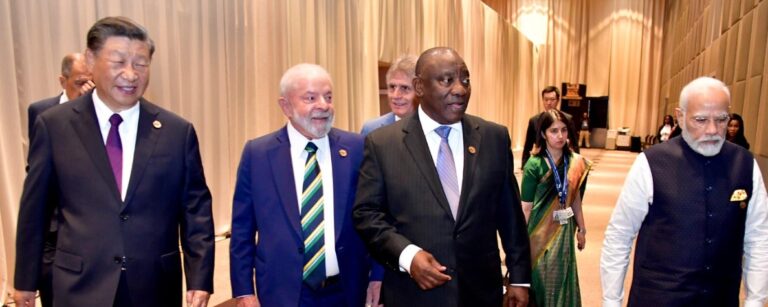The enlargement of the Brics to six new members (Saudi Arabia, Argentina, Egypt, United Arab Emirates, Ethiopia, Iran), sanctioned by the 15th summit in South Africa, could have profound effects on the global economic and financial system.
The potential increase in intra-group trade in local currencies, control of key commodities such as energy, and the design of a common currency represent a gauntlet thrown down to the hegemony of the U.S. and the dollar. Here’s what was decided in Johannesburg and statements from key players.
Table of Contents
The enlargement of the Brics
It was the host, South African President Cyril Ramaphosa, who announced on X that the 15th Brics summit would end with a tangible result.
Namely, the entry into the group, effective January 1, 2024, of six new states such as Saudi Arabia, Argentina, Egypt, the United Arab Emirates, Ethiopia, and Iran.
“As five (founding) members of the Brics,” Ramaphosa posted, “we have reached an agreement on the guiding principles, standards, criteria and procedures of the Brice expansion process.”
The six new members are the first, among the 23 who applied, to join the emerging country bloc headed by China. Other players, mainly from Africa, such as Nigeria and Ghana, have expressed interest even if only informally for now.
Triumphant statements
Also present in Johannesburg, unlike a Vladimir Putin hounded by the International Criminal Court’s arrest warrant, Chinese President Xi Jinping said in words reported by Cnbc that the enlargement represents:
“a new starting point for cooperation within the Brics. (…) It will bring new vigor to the Brics cooperation mechanism, further consolidating a force (geared toward promoting) world peace and development.”
For his part, Indian Prime Minister Narendra Modi said that:
“the expansion and modernization of the Brics is a message conveyed to all institutions of the world to reshape themselves in relation to these changing times.”
Toward a common currency?
At their 15th summit, the Brics failed to meet their goal of minting a common currency along the lines that have repeatedly surfaced in the debate over the economic mission to be entrusted to the bloc.
During the summit, Brazilian President Lula noted that the idea of a common currency, “which would increase our options for means of payment and reduce our vulnerabilities,” remains at the speculative stage.
As the New York Times points out, the goal of operations such as increasing domestic trade in local currency and adopting a common currency remains to “reconfigure the current financial and governance system into one that is more open, more diverse and less subject to the power of the dollar.”
Read also: Brazil and Argentina may have a single currency: what is the “Sur” project
The specific weight of Saudi Arabia, the Emirates and Iran
The significance of the entry of three energy powers such as Saudi Arabia, the Emirates and Iran into the Brics was underscored by Bloomberg, for whom the specific weight of this enlargement will be measured “in the form of their immense control over the supply of key commodities.”
The Brics thus come to shape up, according to the financial news outlet, as a “framework in which to forge a common energy strategy” that would give birth to two immediate effects. “Increasing trade using their own currencies and reducing dependence on the dollar”. And, at least potentially, “slowing the transition from fossil fuels” to green energy.
This was probably what China had in mind when it offered to mediate a diplomatic agreement between Saudi Arabia and Iran that led to the thawing of relations between the two rival energy giants last February.
For Persian Gulf countries such as Arabia and the Emirates, joining the Brics also comes in handy with a view to promoting a diversification of their trading partners without necessarily giving up their privileged security relationship with the US.
Read also: Gulf countries: what is their major role in global economy and geopolitical balance












